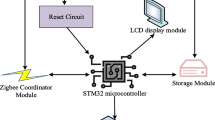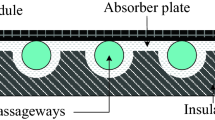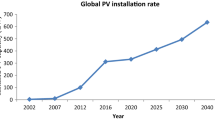Abstract
Most thermoelectric refrigerators used for food conservation are operated by on/off temperature controllers, because of their simplicity and low cost. This type of controller poses a major problem: when the inner temperature reaches the lower setpoint and the thermoelectric modules are switched off, a great amount of the heat stored in the heat exchanger at the hot end of the modules goes back into the refrigerator, by heat conduction through the modules and the heat extender. This effect significantly increases the electric power consumption of the refrigerator. This work studies experimentally the influence of different temperature control systems on the electric power consumption and coefficient of performance of a thermoelectric refrigerator: an on/off controller, a proportional–integral–derivative controller, and a novel operating system based on idling voltages. The latter provides voltage to the modules once the inner temperature reaches the lower setpoint, instead of switching them off, preventing heat from going back. A prototype has been constructed to compare these operating systems. Results prove that the controller based on idling voltages reduces the electric power consumption of the refrigerator by 32% and increases the coefficient of performance by 64%, compared with the on/off controller.
Similar content being viewed by others
Abbreviations
- COP:
-
Coefficient of performance
- D :
-
Difference between limits of the inner temperature (°C)
- EPC:
-
Electric power consumption (kWh/day)
- I :
-
Electric current through the thermoelectric modules (A)
- L :
-
Lower limit of the inner temperature (°C)
- \( \dot{Q}_{\rm{C}} \) :
-
Heat flow rate absorbed by the thermoelectric modules (kWh/day)
- R wall :
-
Thermal resistance of the wall of the refrigerator (K/W)
- T e :
-
Environment temperature (K)
- T in :
-
Inner temperature (K)
- T 0 :
-
Average inner temperature (K)
- V :
-
Voltage supplied to the thermoelectric modules (V)
- τ :
-
Time (s)
References
L.E. Bell, Science 321, 1457 (2008).
S.B. Riffat and M. Xiaoli, Appl. Therm. Eng. 23, 913 (2003).
D.M. Rowe, Thermoelectrics Handbook Macro to Nano, 1st ed. (Boca Raton, FL: CRC, 2006).
J.R. Sootsman, D.Y. Chung, and M.G. Kanatzidis, Angew. Chem. Int. Ed. 48, 8616 (2009).
D. Astrain and J.G. Vián, J. Enhanc. Heat. Transf. 12, 159 (2005).
D. Astrain, J.G. Vián, and M. Domínguez, Appl. Therm. Eng. 23, 2183 (2003).
D. Astrain, A. Martinez, J. Gorraiz, A. Rodríguez, and G. Pérez, J. Electron. Mater. 41, 1081 (2012).
Author information
Authors and Affiliations
Corresponding author
Rights and permissions
About this article
Cite this article
Martínez, A., Astrain, D., Rodríguez, A. et al. Reduction in the Electric Power Consumption of a Thermoelectric Refrigerator by Experimental Optimization of the Temperature Controller. J. Electron. Mater. 42, 1499–1503 (2013). https://doi.org/10.1007/s11664-012-2298-9
Received:
Accepted:
Published:
Issue Date:
DOI: https://doi.org/10.1007/s11664-012-2298-9




